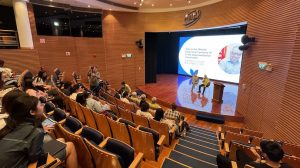A piece of research on Macao casino employees has found that feelings of job insecurity are positively related to the generation of psychological distress, namely depression, anxiety and stress. The study, involving a scholar from IFTM, suggested that, in psychological health promotion campaigns aimed at casino employees, the issue of perceived job insecurity should be a key factor addressed via organisational policies and activities.
According to the researchers, “more attention should be directed to organisational strategies” to minimise the effect of perceived job insecurity in generating psychological distress among workers in Macao’s casino industry. The scholars suggested that organisations and their respective managements should try to communicate regularly with staff via a variety of channels. This was in order to keep employees informed on various topics, and to ensure that any organisational changes were regarded by staff as arrived at due to a transparent process.
The researchers also said that casino operators could reduce overall perception of job insecurity among staff via organisational-level intervention programmes. This was on the basis such schemes boosted employees’ sense of empowerment, and could keep staff informed of organisational topics.
The research work was produced by IFTM Assistant Professor Dr. Cindia Lam Ching Chi, in partnership with Dr. Francis Cheung Yue Lok from Hong Kong’s Lingnan University, and the University of Macau’s Dr. Anise Wu Man Sze. Their paper, titled “Job Insecurity, Occupational Future Time Perspective, and Psychological Distress Among Casino Employees”, was published in the Journal of Gambling Studies.
The study results were based on a survey answered by 1,014 full-time employees across an aggregate of 39 Macao casinos.
The role of occupational future time perspective
The researchers found that feelings of job insecurity among casino employees were positively associated with psychological distress, “either directly or via other channels, such as a change of how one perceives the span of future in the occupation”. According to the scholars, staff members often feel powerless over job insecurity “because most of the time, this perception is beyond employees’ own control.”
The study authors said theirs was the first piece of research to test whether ‘occupational future time perspective’ was a mediating factor in the relationship between perceived job insecurity and psychological distress. The study found significant evidence that it was.
According to the researchers, feelings of job insecurity relate to a person’s negative evaluation and anticipation regarding whether they can keep a current job. Occupational future time perspective, on the other hand, refers to a person’s perceptions of the occupational future in terms of time and opportunities in the workplace, regardless of the person’s current position or organisation. Such perspective is therefore “a more flexible cognitive construct that can change over time”.
The researchers stated that occupational future time perspective was “negatively related to psychological distress”. This meant that workers with an expansive future time perspective – i.e., an outlook that they would have a long career with abundant opportunities in the workplace – tended “to report better psychological functioning”.
In conditions involving perception of job insecurity, or of general uncertainty, the perception of “future work life will be limited,” said the study authors. They added that a “reduced occupational future time perspective further endangers the psychological well-being of employees under the condition of job insecurity”.
The study concluded therefore, that feelings of job insecurity affected employee psychological distress via 2 routes: they could directly endanger an individual’s psychological health, and they could also influence staff members’ well-being via eroding their occupational future time perspective.
More info
Dr. Francis Cheung Yue Lok is a Professor in the Department of Applied Psychology at Lingnan University in Hong Kong. He has a doctorate from the Chinese University of Hong Kong. His research interests include emotional management, employee burnout, and work-family interference.
Dr. Anise Wu Man Sze is a Professor in the Department of Psychology at the University of Macau. She holds a PhD from the Chinese University of Hong Kong. Her current research focus includes behavioural addiction, alcohol and other substance use, and the physical and mental well-being of Chinese senior citizens.
https://doi.org/10.1007/s10899-019-09855-y









